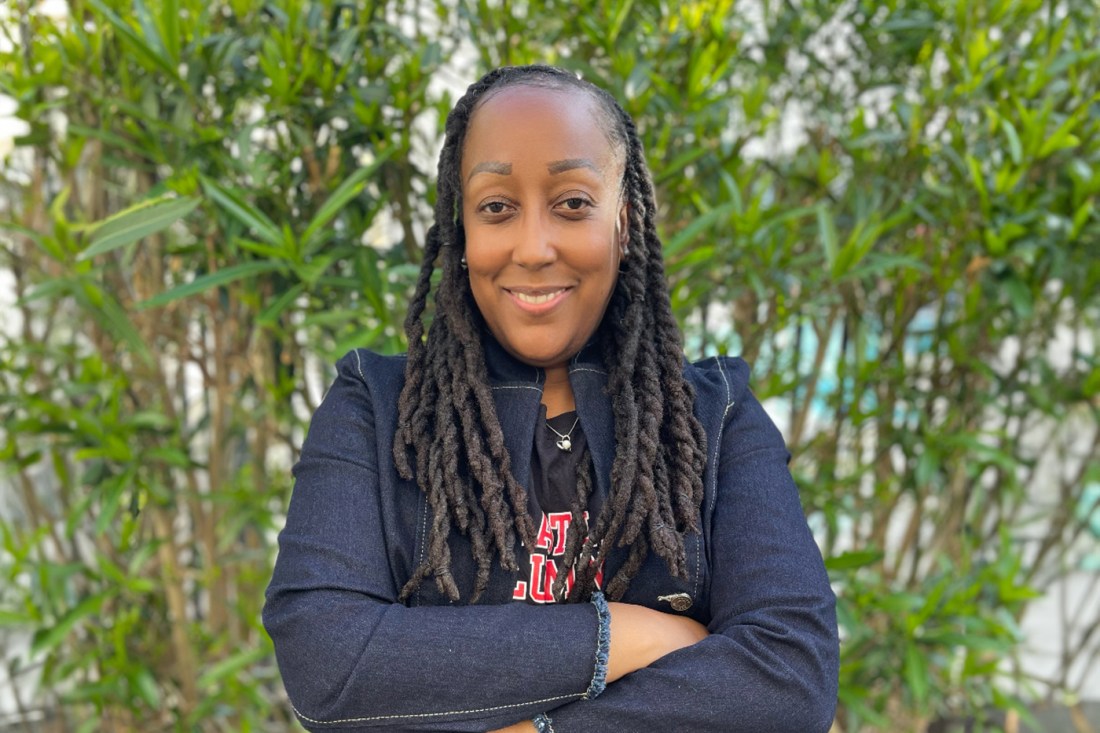At Juneteenth event, Northeastern research lays out the historical struggle for fair employment in the US
Nneka Allen-Harrison’s new study is titled “Bay Area Black Voices: Employment Outcomes of the Black Labor Force in the San Francisco Bay Area.”

OAKLAND, Calif. — Academic researchers and community leaders celebrated Juneteenth at Northeastern University’s Oakland campus last week by taking an unflinching look at inequitable employment outcomes for Bay Area residents of color.
The event coincided with the release of “Bay Area Black Voices: Employment Outcomes of the Black Labor Force in the San Francisco Bay Area,” a study by Nneka Allen-Harrison, an assistant adjunct professor and Community to Community policy fellow at Northeastern.
Allen-Harrison’s qualitative research synthesizes employment data to explore economic disparity in the Bay Area. Known for its robust economy and diverse population, the region also struggles with a wide racial wage gap. Citing data from the U.S. census, Allen-Harrison notes that Black men in the Bay Area earned a median income of less than $60,000 in 2019, while white men earned more than $80,000 that year.
Allen-Harrison’s study lays out the historical struggle for fair employment in the U.S., beginning in the 1860s with the expansion of the Pullman Palace Car Company, which hired Black men to work as sleeping car porters.

Employment options have been limited for Black Americans, however. By 1950, most Black people worked as laborers or domestic help. Workforce segregation is still strong, Allen-Harrison notes. Analyzing data from the 2018 U.S. Census American Community Survey, she reports that the largest number of Black residents in the Bay Area work in low-salary jobs including protective services, transportation and health care support.
Unemployment rates have tended to be high, as well. In 2020, the unemployment rate for Black Americans was 9.9 percent, nearly twice the 5.9 percent rate for white Americans.
Featured Posts
Disproportionate rates of incarceration are a major factor in this picture, Allen-Harrison writes. A felony conviction or served jail time can lead to “a period of unemployment and present barriers to securing work upon re-entering the workforce,” she writes. Many job applications ask candidates whether they have been convicted of a felony, she notes, which is also true of many applications for housing.
In her study, Allen-Harrison highlights examples of success and progress. After interviewing Black workers who live in the Bay Area, as well as leaders of community-based organizations, she explored whether an approach called empowerment learning could support Black adults and improve their economic outcomes.
Empowerment learning, she writes, is a liberation methodology in which students take charge of their own educational experiences. It focuses on critical thinking, autonomous learning and personal development. Allen-Harrison provides detailed profiles of two organizations that put empowerment learning into practice.
Based in Alameda County, EMS Corps is a five-month EMT training program that includes a monthly stipend, mentorship and job placement. More than 400 adults have graduated from the program since 2012, the majority Black men. Allen-Harrison notes that EMS Corps emphasizes both career guidance and life coaching, with as much attention to participant’s personal needs as to their career development.
Working with young adults from age 17 to 24, New Door Ventures demonstrates empowerment learning by supporting young adults without high school diplomas to earn their GED. The program organizes six-month paid internships with employers and offers case management and comprehensive services to help them transition into long-term careers. Seventy-six percent of participants are employed three years after leaving New Door Ventures.
“The disparities in employment and economic outcomes for the Black labor force in the Bay Area underscore the urgent need for solutions that promote social empowerment and create a more equitable society,” Allen-Harrison writes.
Empowerment can also be addressed legislatively, she writes. Reparations that address issues including poverty, criminal justice reform, property rights and education are a potent tool to combat systemic anti-Black racism, Allen-Harrison writes.
She notes the 2024 California Legislative Black Caucus’s Reparation Priority Bill Package, which includes 14 bills introduced in the state legislature. Individually they address civil rights, criminal justice reform, health, business and education. The legislative package was introduced in February.
Allen-Harrison takes this work one step further by recommending the creation of regional review boards specifically to address workplace grievances filed by Black workers. Black people in the workforce are unprotected, she says, because the state’s Equal Employment Opportunity Commission is overwhelmed with grievance cases.
“The state has a responsibility to offer support to ensure that the EEOC has the oversight that is needed,” she says. “Regional review boards could serve as an intermediary, because state oversight is clearly not enough.”











